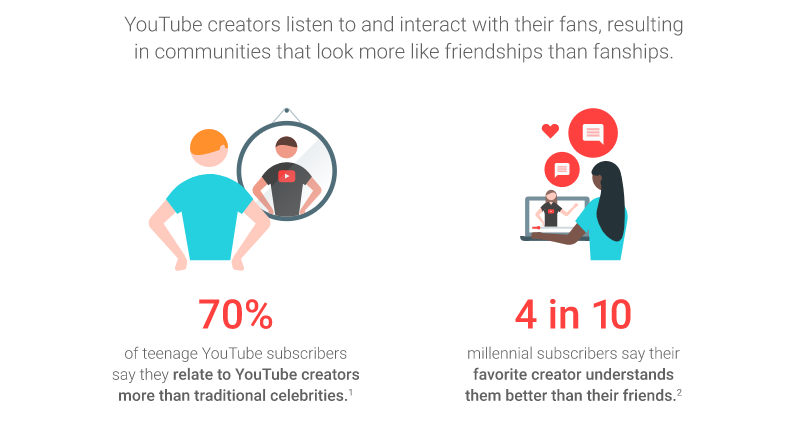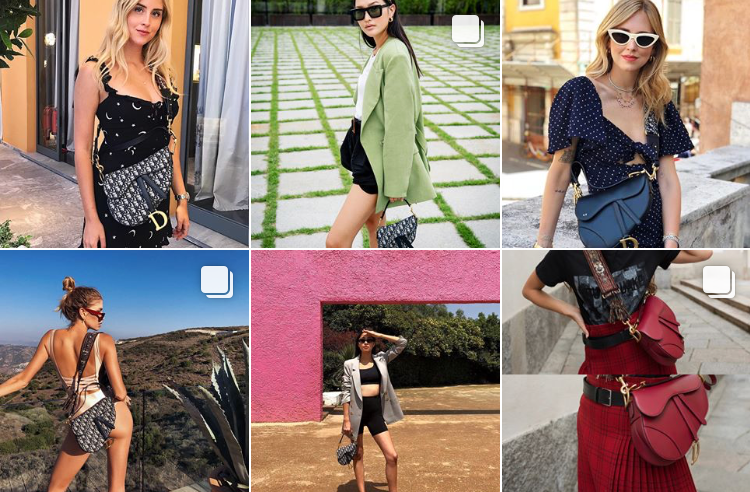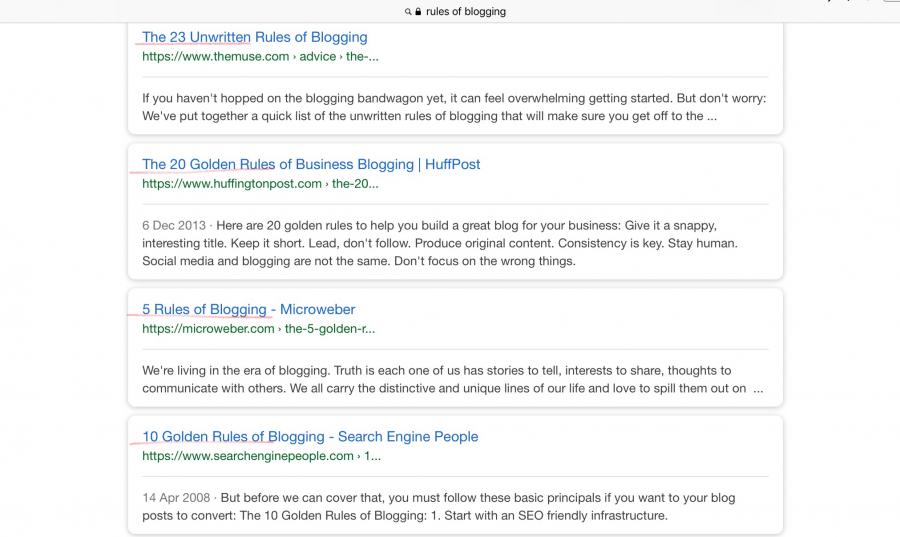
Influencer marketing has some serious ethical issues
If you're online, you have definitely encountered influencer marketing. Swiping through your news feed, you see a girl in her room talking to the camera, sharing her experience with that new product you've thought of buying. She seems so enthusiastic and genuine, smiling to her followers, sweet and friendly. How could she lie to you? That is, until you scroll down to the word “ad” under her enthusiastic post. This little insignificant detail makes it fair, but you had a sinking feeling in your stomach, didn't you? What if the product isn't good? What if the post hadn't been marked as an ad at all?
In recent years consumer trust in classic media started has dropped. People are fed up with seeing traditional commercials everywhere they go. The straightforward offer to buy something, fit into one minute on TV, causes lots of irritation and fails to gain trust in the product. In the search for profit, a new type of business model emerged on social media. But what are the ethics of blogging? How can we, ordinary viewers, differentiate between commercial content and genuine, ‘friendly' blogger advice? And what are the risks and downsides of this type of marketing?
Influencer marketing
When blogs were first introduced in the late 1990s, many were enthustic about this new, accessible tool for sharing one's thoughts. For the first time authentic opinions could be shared and accessed by anyone with a working internet connection (Drushel & German, 2011). However, over time, blogs started to lose their 'authenticity'.
"Currently, the concept of digital influencer encompasses multi-platform high-profile Internet microcelebrities who accumulate a following on social media and/or blogs through the textual and visual narration of their personal lives and lifestyles and monetize their following by endorsing brands for a fee (i.e., paid eWOM)" (Jiménez-Castillo & Sánchez-Fernández, 2019).
Influencer marketing allows for many opportunities. Blog or vlog monetization is a desirable career path for many young people. A great deal of the money earned by bloggers is due to profitable commercial contracts. Blogging, as well as vlogging, is a relatively new niche which has proven effective in terms of product representation. Such commercial cooperation is profitable for both influencers and brands.
Digital influencers are believed to be more powerful in terms of brand representation within their niche communities in comparison to traditional celebrities (Jiménez-Castillo, & et al.Sánchez-Fernández, 2019). Bloggers and vloggers address the public in a straightforward manner, building a network of followers with whom they share their everyday doings and talk with in comment sections. Influencers look like your girl or boy next door, who would not recommend you something that was bad, harmful, or low quality. However, this is not the whole story.

Influencer marketing statistics
Influencers today have quite some power over their audience. Among all social media marketing activities, "[...] firms are increasingly turning to digital influencers to endorse their brands, because influencers connect the intended target audience with brands while maintaining a direct communication with their following" (Jiménez-Castillo, & et al.Sánchez-Fernández, 2019). This choice is based on the belief that "influencers have the power to persuade consumers to buy the endorsed brands" (Jiménez-Castillo, & et al.Sánchez-Fernández, 2019). Through carefully constructed messages, influencers impose their authority on the public, gaining their trust and building a network.
Marketers have developed specific terms to describe the process of how bloggers and influencers attract new customers: “Influencer marketing is an approach that identifies and targets influencers in a market. Influencers make up communities called Decision-maker ecosystems, which revolve around a decision-maker” (Brown & Hayes, 2008). This approach has conquered the market in recent years.
Influencers' neutral and ‘friendly’ messages, which mostly sound like they want to give you a piece of life-changing advice, contain commercials that often do not look like commercials at all. Many fans are more likely to purchase a product presented by their favorite blogger. What they do not understand is that bloggers are not always responsible for the goods they promote.
In fact, thousands of influencer commercial messages have been created by the brands themselves. In the process of negotiating product promotion contracts, companies can provide a long list of details of regarding how the product should appear in a post, including product positioning, color palette, and even preferred filters.
The main question here is, are there any ethics in influencer marketing? Is there a line they cannot cross? At what point do they break consumers' trust?
FYRE festival: expectations meet reality
The Netflix documentary FYRE: The greatest festival that never happened highlights influencers' limited responsibility. The documentary investigates a music festival that was widely promoted by social media stars but turned out to be a scam. Influencers sometimes do not have any understanding of the nature or quality of the product they promote.

Fyre Festival expectation vs. reality
The fraud was, and still is, partly blamed on the influencers who were invited to participate in the promo campaign. By showing Instagram users appealing and beautifully staged posts, they misled thousands into thinking that the actual festival would look like their edited videos. In reality, the festival turned out to be a disaster with no proper organization. The festival team went bankrupt and was not able to provide basic living conditions for thousands of visitors. Most of the people traveled to the event because they trusted the appealing pictures on influencers' Instagram accounts.
Among many of the Instagram micro-celebrities who promoted the failed festival, only one tagged her post as an #ad. But does a hashtag really make influencer marketing practices any better?
Influencers vs. deceptive marketing
Influencers who use social media fame to advertise products without actually specifying that their posts are ads can face legal consequences for deceptive marketing: "Deceptive marketing is the use of false and/or misleading information to capture the attention of the consumer through the usage of false information to persuade buyers into a business transaction that will not typically be beneficial to you but “yes” beneficial to the one doing the deceptive advertising" (MA SMP, 2019).
Posting an ad without mentioning that it is advertisement can, in many instances, also be regarded as deceptive marketing. By hiding the nature of the post the influencer lies to customers. However, companies themselves sometimes urge this type of advertising.

Dior Saddle promotion by influencers
A recent scandal concerning this kind of hidden advertisement featured the Dior fashion company. Around one hundred influencers worldwide simultaneously published posts with a specific type of Dior bag. They did not mention that these posts reflected paid sponsorship, resulting in many discussions and debates in the fashion world.
Deceptive marketing can have both legal and reputational consequences for influencers and brands. Even though Instagram has introduced a 'paid sponsorship' button specifically for public figures, actually using it is not seen as desirable. This is just one more reason to start thinking about blogging ethics.
Blogging ethics
There is no official set of rules or responsibilities for influencers. Famous bloggers communicate information to millions of people, but do not have any set limitations on their actions. Numerous sets of rules that vary both in number and in nature can be found online. In the golden age of blogging and influencer marketing, how have we not yet reached a consensus on something so simple and basic?

Heterogeneous results for 'rules of blogging'
There is more information on blogging ethics, for instance a code based on the Code of Ethics for the Norwegian Press published by the Norwegian Press Association. A short version of the document looks like this:
- It is your right to voice your opinion
- Be critical of everything, even yourself
- Use your power to protect
- Tell the truth at all times
- Present your opinion as your opinion
- State your allegiances to stay independent
- Reveal your sources unless doing so can harm your sources
- Be critical of your sources and seek independent verification
- Always give credit where credit is due
- Always preserve the intended meaning of a given statement
- Give your opponent a chance to respond
- Admit and correct your mistakes immediately (MOR10, 2019)
Of particular interest regarding influencer marketing are numbers 4, 8, and 9. Blogging is a job, however one without a contract that would oblige bloggers to follow any ethical norms. Since there is no legal agreement to these points, many influencers do not feel the need to follow them.
Another challenge appears when trying to regulate these issues internationally. Toledano and Avidar (2016) found differences in ethical practices in different countries. The question becomes whether it is even possible to establish common ethical practices among bloggers. If one country enacts stricter regulations than the others, influencers can quickly become 'travel bloggers', searching for the place where deception in marketing is not subject to law.
Any consequences?
If a product is inexplicitly advertised by a famous blogger, it is more likely to attract the attention of authorities. If we take into account bloggers with smaller audiences, they are more often left without proper legal attention, and thus continue with inexplicit advertising practices. This might also lead to significant tax payment losses.
Social media marketing is often thought of as 'no big deal': if a blogger recommends a product they do not actually use, it's just like any other commercial. It is a big deal, however, if the product is unhealthy, harmful, or simply a scam. Bloggers are not usually held responsible for promoting low-quality products, but they are held responsible even less if they are not officially 'advertising'.
Users need to be more critical of the information they see online. Double or even triple checking before you order 'that one cool product', recommended by a locally famous blogger could be one such measures. However, with the growing popularity of this type of income, it is high time we start realizing that most of the products we see online from influencers are ads, even when they do not mention it. Since there are still no legal consequences for such advertising, and no real customer protection from bloggers' commercial deals, only users themselves can take care of their safety.
References
Brown, D., Hayes, N. (2008). Influencer Marketing. Who really influences your customs? Elsevier Ltd.
Drushel, B. E., German, K. (2011). The Ethics of Emerging Media: Information, Social Norms, and New Media Technology. Bloomsbury Publishing.
Gush, C. (2018). Dior's Saddle Bag Is Back – Along With A Controversial Influencer Campaign.
Jiménez-Castillo, D. & Sánchez-Fernández, R. (2019). The role of digital influencers in brand recommendation: Examining their impact on engagement, expected value and purchase intention. International Journal of Information Management, 49, 366-376.
Massachusetts SMP, (2019). Deceptive marketing.
MOR10. CODE OF ETHICS FOR BLOGGERS, SOCIAL MEDIA AND CONTENT CREATORS.
Richardson, D. (2017). BLAME THE FYRE FESTIVAL FIASCO ON THE PLAGUE OF CELEBRITY INFLUENCERS. Wired.
Toledano, M. & Avidar, R. (2016). Public relations, ethics, and social media: A cross-national study of PR practitioners. Public Relations Review, 42(1), 161-169.